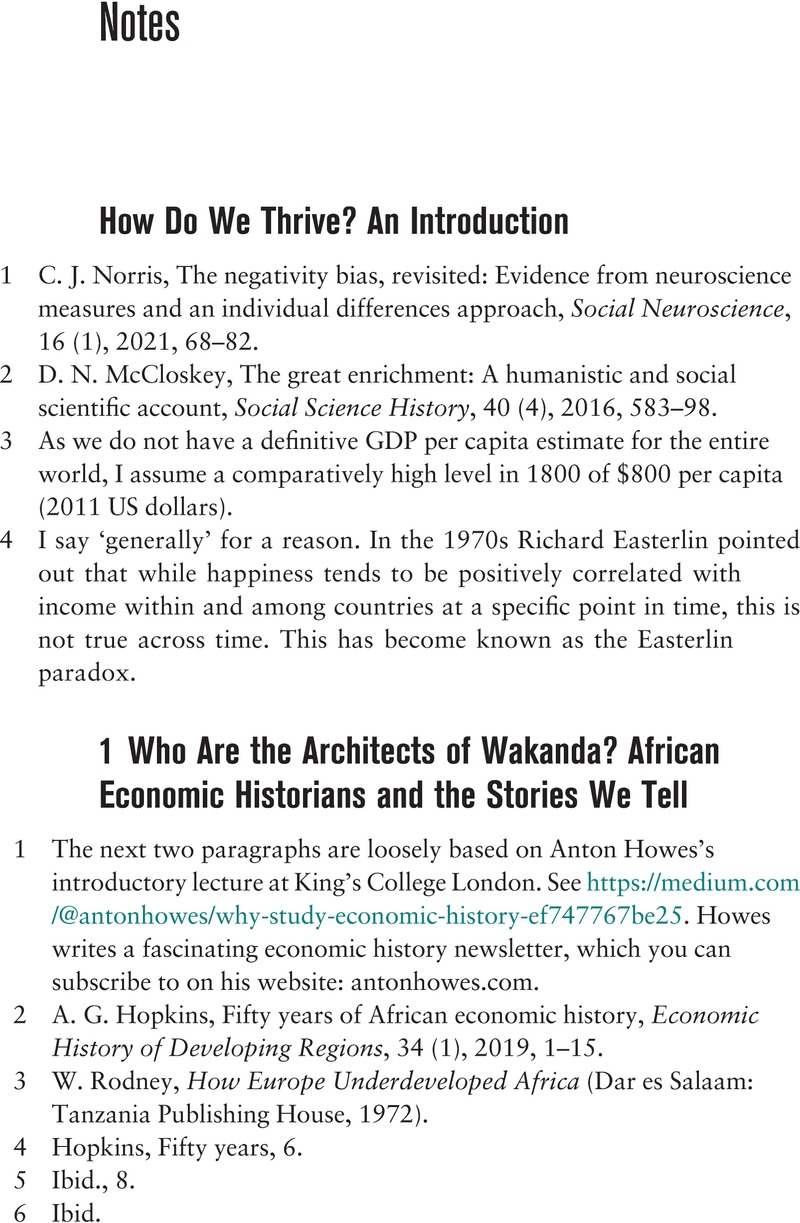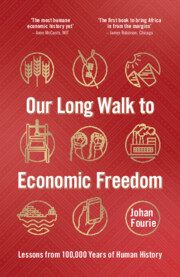Book contents
- Our Long Walk to Economic Freedom
- Our Long Walk to Economic Freedom
- Copyright page
- Dedication
- Contents
- Figures
- Acknowledgements
- A Note on Sources and Terminology
- How Do We Thrive?
- 1 Who Are the Architects of Wakanda?
- 2 What Happened at Blombos in 70,000 BCE?
- 3 Why Are the Danes So Individualistic?
- 4 Why Does isiXhosa Have Clicks?
- 5 How Did Joseph and His Eleven Brothers Solve the Three Economic Problems?
- 6 What Do Charlemagne and King Zwelithini Have in Common?
- 7 Why Do Indians Have Dowry and Africans Lobola?
- 8 Who Was the Richest Man Ever to Live?
- 9 How Did 168 Spanish Conquistadores Capture an Empire?
- 10 Why Was a Giraffe the Perfect Gift for the Chinese Emperor?
- 11 Who Visited Gorée Island on 27 June 2013?
- 12 What Is an Incunabulum?
- 13 Who Was Autshumao’s Niece?
- 14 What Did Thomson, Watson & Co. Purchase?
- 15 What Do an Indonesian Volcano, Frankenstein and Shaka Zulu Have in Common?
- 16 Why Was the Spinning Jenny Not Invented in India?
- 17 Why Did Railways Hurt Basotho Farmers?
- 18 What Did Sol Plaatje Find on His Journey through South Africa?
- 19 Why Can You Have Any Car as Long as It Is Black?
- 20 What Does a Butterfly Collector Do in the Congo?
- 21 Who Wrote the Best Closing Line of Modern Literature?
- 22 How Could a Movie Embarrass Stalin?
- 23 Who Is the Perfect Soldier?
- 24 What Was the Great Leap Forward?
- 25 Why Should We Cry for Argentina?
- 26 Who Was the Last King of Scotland?
- 27 How Did Einstein Help Create Eskom?
- 28 Why Would You Want to Eat Sushi in the Transkei?
- 29 Why Do the Japanese Play Rugby?
- 30 What Do Lego and the Greatest Invention of the Twentieth Century Have in Common?
- 31 What Is Funny about Moore’s Law?
- 32 What Bubbles in Iceland?
- 33 What Did The Economist Get Spectacularly Wrong?
- 34 Will Madiba’s Long Walk to Freedom Ever End?
- 35 What Should No Scholar Ever Do?
- Epilogue
- Notes
- Bibliography
- Index
Notes
Published online by Cambridge University Press: 30 August 2022
- Our Long Walk to Economic Freedom
- Our Long Walk to Economic Freedom
- Copyright page
- Dedication
- Contents
- Figures
- Acknowledgements
- A Note on Sources and Terminology
- How Do We Thrive?
- 1 Who Are the Architects of Wakanda?
- 2 What Happened at Blombos in 70,000 BCE?
- 3 Why Are the Danes So Individualistic?
- 4 Why Does isiXhosa Have Clicks?
- 5 How Did Joseph and His Eleven Brothers Solve the Three Economic Problems?
- 6 What Do Charlemagne and King Zwelithini Have in Common?
- 7 Why Do Indians Have Dowry and Africans Lobola?
- 8 Who Was the Richest Man Ever to Live?
- 9 How Did 168 Spanish Conquistadores Capture an Empire?
- 10 Why Was a Giraffe the Perfect Gift for the Chinese Emperor?
- 11 Who Visited Gorée Island on 27 June 2013?
- 12 What Is an Incunabulum?
- 13 Who Was Autshumao’s Niece?
- 14 What Did Thomson, Watson & Co. Purchase?
- 15 What Do an Indonesian Volcano, Frankenstein and Shaka Zulu Have in Common?
- 16 Why Was the Spinning Jenny Not Invented in India?
- 17 Why Did Railways Hurt Basotho Farmers?
- 18 What Did Sol Plaatje Find on His Journey through South Africa?
- 19 Why Can You Have Any Car as Long as It Is Black?
- 20 What Does a Butterfly Collector Do in the Congo?
- 21 Who Wrote the Best Closing Line of Modern Literature?
- 22 How Could a Movie Embarrass Stalin?
- 23 Who Is the Perfect Soldier?
- 24 What Was the Great Leap Forward?
- 25 Why Should We Cry for Argentina?
- 26 Who Was the Last King of Scotland?
- 27 How Did Einstein Help Create Eskom?
- 28 Why Would You Want to Eat Sushi in the Transkei?
- 29 Why Do the Japanese Play Rugby?
- 30 What Do Lego and the Greatest Invention of the Twentieth Century Have in Common?
- 31 What Is Funny about Moore’s Law?
- 32 What Bubbles in Iceland?
- 33 What Did The Economist Get Spectacularly Wrong?
- 34 Will Madiba’s Long Walk to Freedom Ever End?
- 35 What Should No Scholar Ever Do?
- Epilogue
- Notes
- Bibliography
- Index
Summary

- Type
- Chapter
- Information
- Our Long Walk to Economic FreedomLessons from 100,000 Years of Human History, pp. 229 - 252Publisher: Cambridge University PressPrint publication year: 2022

